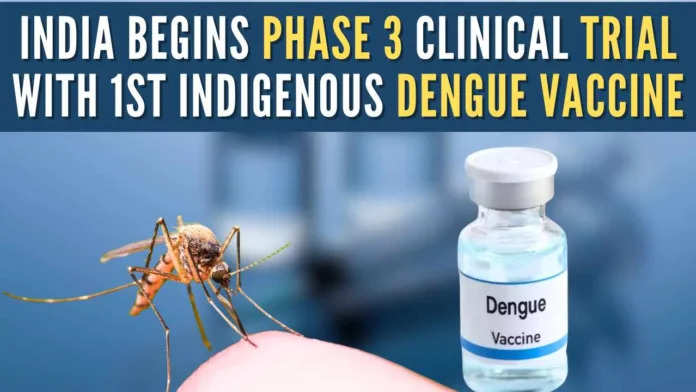India has started its first Phase III clinical study for an indigenous dengue vaccine called "DengiAll." This is a big step forward in the fight against dengue fever. Panacea Biotech made this groundbreaking vaccine that is meant to protect against all four serotypes of the dengue virus. This is a very important step towards reducing the broad effects of this disease that is spread by mosquitoes.
On August 14, the first dose was given at the Pandit Bhagwat Dayal Sharma Post Graduate Institute of Medical Sciences (PGIMS) in Rohtak, Haryana. This marked the official start of the study. This is a major turning point in India's fight against dengue, which has been a health problem in the country for a long time.
The size and scope of this trial are what make it stand out. The Phase III study will take place at 19 sites in 18 Indian states and Union Territories over the next two years. The goal of this thorough method is to test the vaccine's safety and effectiveness in a wide range of people. A total of 10,335 healthy people will be followed up on in the trial. This makes it one of the largest studies of its kind in India.
The creation and testing of "DengiAll" is a big step forward in the fight against dengue. It is very important that the vaccine can work against all four types of the dengue virus, since any of these can cause the sickness. Many of the current vaccines only protect against one or two serotypes. This makes DengiAll a possibly game-changing tool in the fight against this crippling disease.
The Indian Council of Medical Research (ICMR) is the main source of funding for this big project. This shows how important this effort is to India's public health strategy. Panacea Biotech is also giving money, which shows that the public and private sectors are working well together to solve important health problems.
The fact that this study was done by a group of people working together shows that India is serious about improving public health. The project is a coordinated effort to improve health outcomes and find solutions that meet the specific needs of the Indian population. It uses both government funding and private expertise.
Dengue fever, which is spread by Aedes bugs, is still a big problem in India and many other places around the world. The disease can cause serious flu-like symptoms and can sometimes turn into dengue hemorrhagic fever or dengue shock syndrome, both of which are very dangerous and can kill you. The creation of a vaccine that protects against all four serotypes is a major step forward in the fight to lower the number and intensity of dengue outbreaks.
Before the vaccine can be widely used, the Phase III study is a very important step. Researchers will keep a close eye on the subjects during this phase to see if they have any side effects and to see how well the vaccine works in real life. As long as this study goes well, "DengiAll" could become an important tool for preventing dengue not only in India but also in other places where the disease is a problem.
Health experts, policymakers, and the public will all be keeping a close eye on the study as it goes on. The study's results could have big effects on public health plans in India and beyond. They could lead to a better way to fight one of the most difficult vector-borne diseases in the world.
In conclusion, India's start of the Phase III study for "DengiAll" is a good sign in the fight against dengue fever. This trial is a very important step towards better health outcomes and moving forward with global efforts to control dengue because it takes a comprehensive approach and has strong backing from both the government and the private sector.
--

